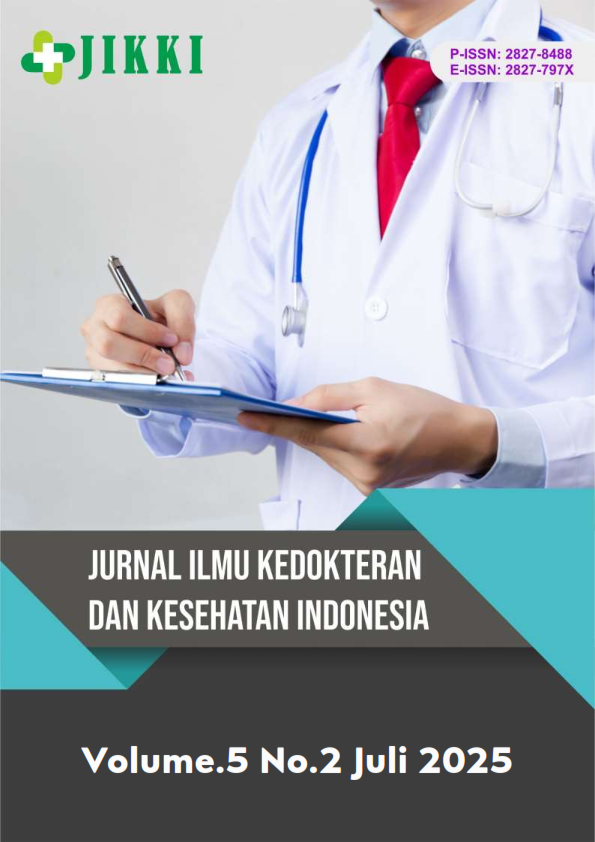Hubungan Self-Esteem dengan Fear of Missing Out (FoMO) pada Ibu-Ibu di Sumatera Barat
DOI:
https://doi.org/10.55606/jikki.v5i2.6164Keywords:
Fear of Missing Out, Mothers, Self-Esteem, Social Media, West SumatraAbstract
This study aims to examine the relationship between self-esteem and fear of missing out (FoMO) among mothers in West Sumatra. FoMO is characterized by anxiety or fear of missing important experiences, especially those seen on social media. A total of 385 mothers aged 18–40 who actively use social media participated in this study. Using a quantitative correlational method and purposive sampling, data were analyzed through Pearson Product-Moment correlation. The results showed a significant negative relationship between self-esteem and FoMO (r = -0.622, p < 0.05). These findings suggest that mothers with lower self-esteem are more prone to FoMO. The study highlights the importance of self-perception in the digital age and provides practical implications for mental well-being among adult women.
References
Abdelraheem, A. Y., & Ahmed, A. M. (2018). The impact of using mobile social network applications on students’ social-life. International Journal of Instruction, 11(2), 1–14. https://doi.org/10.12973/iji.2018.1121a
Abel, J. P., Buff, C. L., & Burr, S. A. (2016). Social media and the fear of missing out. Journal of Business & Economics Research, 14(1), 33–44.
Alwi, M. A., & Razak, A. (2022). Adaptasi Rosenberg’s self-esteem di Indonesia. Seminar Nasional Hasil Penelitian, 1074–1080.
Australian Psychological Society. (2015). Teens suffer highest rate of FOMO. https://www.psychology.org.au
Blackwell, D., Leaman, C., Tramposch, R., Osborne, C., & Liss, M. (2017). Extraversion, neuroticism, attachment style and fear of missing out as predictors of social media use and addiction. Personality and Individual Differences, 116, 69–72. https://doi.org/10.1016/j.paid.2017.04.039
Coopersmith, S. (1967). The antecedents of self-esteem. Freeman.
Hurlock, E. B. (1999). Developmental psychology: A lifespan approach. McGraw-Hill.
Isneniah, D., Nuryani, R., & Lindasari, S. W. (2024). Correlational study: Self-esteem and fear of missing out (FoMO) in emerging adulthood. Holistik Jurnal Kesehatan, 18.
Komala, K., Rafiyah, I., & Witdiawati, W. (2022). Gambaran fear of missing out (FoMO) pada mahasiswa fakultas keperawatan. JNC, 5(1), 1–11.
Kurniawan, R., & Utami, R. H. (2022). Validation of online fear of missing out (ON-FoMO) scale in Indonesian version. Jurnal Neo Konseling, 4(3), 1. https://doi.org/10.24036/00651kons2022
Lewis, S., Pea, R., & Rosen, J. (2010). Beyond participation to co-creation of meaning: Mobile social media in generative learning communities. Social Science Information, 49(3), 351–369.
Przybylski, A. K., Murayama, K., DeHaan, C. R., & Gladwell, V. (2013). Motivational, emotional, and behavioral correlates of fear of missing out. Computers in Human Behavior, 29(4), 1841–1848. https://doi.org/10.1016/j.chb.2013.02.014
Rosenberg, M. (2015). Society and the adolescent self-image. Princeton University Press. https://doi.org/10.2307/2575639
Yong, M., & Wijaya, E. (2023). Hubungan self-esteem dan fear of missing out (FoMO) pada pengguna Instagram. Jurnal Multilingual, 3(1).
Zhao, N., & Zhou, G. (2020). Social media use and mental health: Examining the mediating roles of FoMO and online social support. Current Psychology, 41(2), 831–839. https://doi.org/10.1007/s12144-020-00668-0
Downloads
Published
How to Cite
Issue
Section
License
Copyright (c) 2025 Jurnal Ilmu Kedokteran dan Kesehatan Indonesia

This work is licensed under a Creative Commons Attribution-ShareAlike 4.0 International License.








